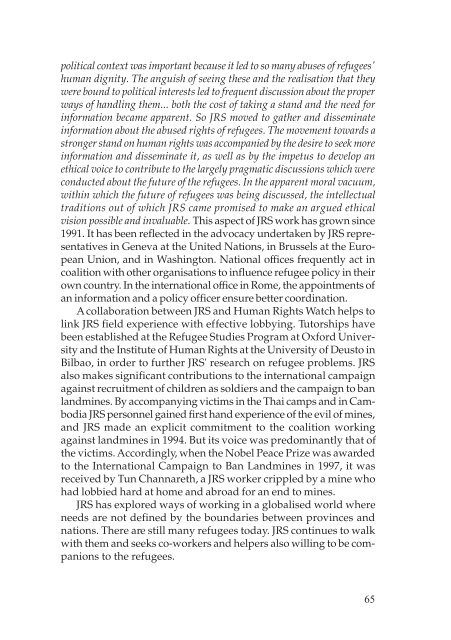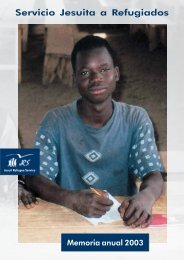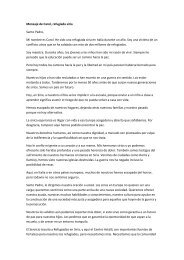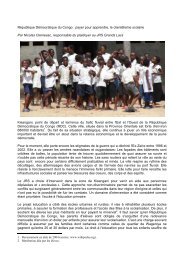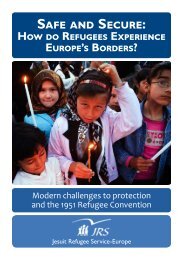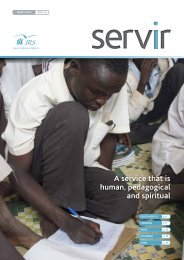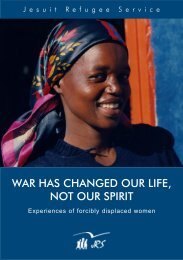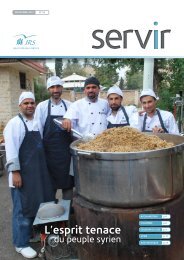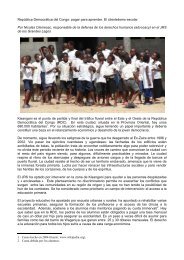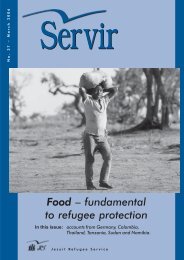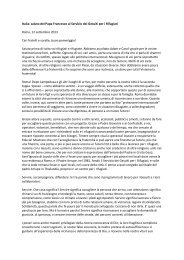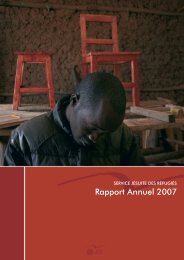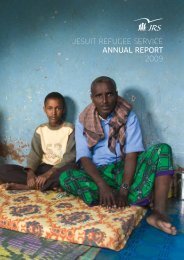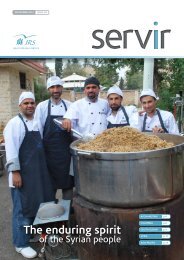EVERYBODY'S CHALLENGE - Jesuit Refugee Service | USA
EVERYBODY'S CHALLENGE - Jesuit Refugee Service | USA
EVERYBODY'S CHALLENGE - Jesuit Refugee Service | USA
You also want an ePaper? Increase the reach of your titles
YUMPU automatically turns print PDFs into web optimized ePapers that Google loves.
political context was important because it led to so many abuses of refugees'<br />
human dignity. The anguish of seeing these and the realisation that they<br />
were bound to political interests led to frequent discussion about the proper<br />
ways of handling them... both the cost of taking a stand and the need for<br />
information became apparent. So JRS moved to gather and disseminate<br />
information about the abused rights of refugees. The movement towards a<br />
stronger stand on human rights was accompanied by the desire to seek more<br />
information and disseminate it, as well as by the impetus to develop an<br />
ethical voice to contribute to the largely pragmatic discussions which were<br />
conducted about the future of the refugees. In the apparent moral vacuum,<br />
within which the future of refugees was being discussed, the intellectual<br />
traditions out of which JRS came promised to make an argued ethical<br />
vision possible and invaluable. This aspect of JRS work has grown since<br />
1991. It has been reflected in the advocacy undertaken by JRS representatives<br />
in Geneva at the United Nations, in Brussels at the European<br />
Union, and in Washington. National offices frequently act in<br />
coalition with other organisations to influence refugee policy in their<br />
own country. In the international office in Rome, the appointments of<br />
an information and a policy officer ensure better coordination.<br />
A collaboration between JRS and Human Rights Watch helps to<br />
link JRS field experience with effective lobbying. Tutorships have<br />
been established at the <strong>Refugee</strong> Studies Program at Oxford University<br />
and the Institute of Human Rights at the University of Deusto in<br />
Bilbao, in order to further JRS' research on refugee problems. JRS<br />
also makes significant contributions to the international campaign<br />
against recruitment of children as soldiers and the campaign to ban<br />
landmines. By accompanying victims in the Thai camps and in Cambodia<br />
JRS personnel gained first hand experience of the evil of mines,<br />
and JRS made an explicit commitment to the coalition working<br />
against landmines in 1994. But its voice was predominantly that of<br />
the victims. Accordingly, when the Nobel Peace Prize was awarded<br />
to the International Campaign to Ban Landmines in 1997, it was<br />
received by Tun Channareth, a JRS worker crippled by a mine who<br />
had lobbied hard at home and abroad for an end to mines.<br />
JRS has explored ways of working in a globalised world where<br />
needs are not defined by the boundaries between provinces and<br />
nations. There are still many refugees today. JRS continues to walk<br />
with them and seeks co-workers and helpers also willing to be companions<br />
to the refugees.<br />
65


